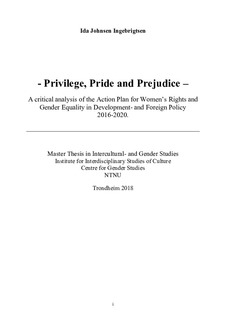| dc.description.abstract | The current political climate shows an increase in misogynistic, xenophobic and right-wing radical groups and general tendencies, clearly evidenced by the language used. The recent years have showed an increased occurrence of hate crimes and a higher acceptance for what would earlier be considered hateful rhetoric. It is therefore of importance to investigate areas in which language is used to define groupings and create an ‘us’ and a ‘them’ such as the Action Plan for Women’s Rights and Gender Equality in Foreign and Development Policy 2016-2020, hereinafter the Action Plan. The action plan delves into the relationship between Norway and other countries and organisations regarding foreign- and development policy matters. Through a close reading of the action plan, this thesis explores the language, both visual and literary, used to describe the different actors in the action plan. The analysis is based on a theoretical framework of postcolonialism, orientalism and feminist theory. The action plan will therefore be understood within this theoretical perspective.
The analysis in this thesis demonstrates how Norway, through the action plan, suggests that they are superior in matters of gender equality and women’s rights. By way of language used in the action plan, Norway indicates a vertical relation between ‘us’ and ‘them’. By examining the imagery in the action plan, it is evident that othering is also perpetuated through signs and symbols. The context in which the action plan was created, namely to be applicable in both the field of foreign affair as well as international development creates a conflict of interests in that foreign affairs aim to promote Norwegian interests abroad, while promoting development can oppose certain Norwegian interests abroad. More often than not, the national interests of Norway are prioritised and the result is a form of ‘othering’ the partner countries.
The analysis show the importance of questioning the use of language when discussing vulnerable topics and knowledge transfer. Furthermore, it shows the value of applying a gendered perspective on the way we use language. Through the use of the aforementioned theoretical framework, I aim to examine the production of meaning in the action plan. | nb_NO |
